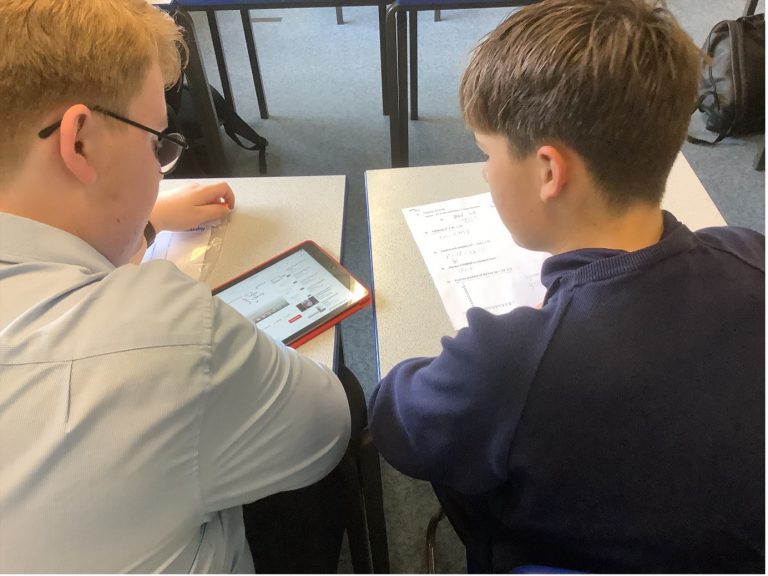Our project aims to address attainment and progress gaps in English and Maths, particularly for disadvantaged students, alongside developing skills which will have benefits across the wider curriculum. We have focused on Key Stage 3 students in order to prevent gaps widening and to secure long-term outcomes. We have focused on 3 strands of development and support: encouraging reading for pleasure at Key Stage 3, providing small-group and one-to-one literacy support for targeted students, and running targeted Maths interventions.
Our Approach
#389 Reading and Maths Development and Interventions – Northgate High School
Richard Grainger
What did we do?
Accelerated reader:
- “It’s good to encourage us to read books.”
- “It’s a challenge and is more fun than just reading.”
- “The competition element is fun, especially the inter-tutor group part.”
Literacy Intervention:
- “There has been lots of interactive stuff, like writing reviews, and it’s helped me to develop. It’s fun being with people in a different group.”
Maths intervention:
- “The extra learning helps you to understand more.”
- “It’s easier working with 6th form students, not a teacher, because you can get on with them well.”
- “There are useful worksheets and videos and it’s helped so far.”
Summary of impact
Accelerated Reader uptake in Year 7 (our main launch year group) has been strong, with over 35 million words logged through quizzes in the first 3 months since we began the programme. Results from the Star Testing programme have enabled us to identify 5 % of Years 7 and 8, plus 1 % or Year 9, requiring urgent intervention, alongside a further cohort of 3-7% in each year group also requiring less-urgent intervention. These lists are being used to generate extraction group classes, with good success seen so far. Our targeted Year 7 students have shown an average increase of +58 on their scaled score and +6 months on their reading age. Targeted Year 8 students are +36 on their scaled scores and +4 months of reading age. Targeted Year 9 students, who have been receiving intervention for the longest time, are +150 on their scaled score and +15 months on the reading age.
Steps taken
A crucial first step was for us to appoint and train an Interventions Coordinator to oversee the day-to-day running of the various strands of our project. This proved to be more challenging than expected, as a result of recruitment difficulties which had left us short-staffed within our support staff team. We decided the role was too important to delay any further and, after advertising the post, we were able to successfully recruit a coordinator who was then able to become familiar with the tasks and processes necessary.
To encourage reading for pleasure at Key Stage 3 we purchased Accelerated reader licenses for all Year 7 and Year 8 students. Star Reading tests, as part of the package, have allowed us to identify each student’s reading age and to direct them to books within their zone of proximal development. All library books have been badged to match the A.R. scheme and students can borrow iPads to conduct their book quizzes. All Year 7 English classes spend one lesson per week timetabled in the library in support of the programme. All English teachers and all Year 7 tutors have been trained in how A.R. works and how to support their students, with the aim to roll this through into Year 8. A rewards system is being developed to celebrate students who reach their personal quizzing targets, or specified word count targets, and inter-group competitions are also being promoted.
We have used Star Testing data to identify students in need of further literacy support. We purchased additional stand-alone licences to cover all of Year 9 and have developed a regular schedule of testing dates across all of Key Stage 3. Small groups of targeted students complete literacy support lessons by extraction, on a rolling basis, and further students are supported through an after school Extreme Readers programme. We plan to augment this with Catch-Up Literacy sessions, and we have a team of T.A.s scheduled to complete the training for this programme.
Our Maths interventions have been targeted initially at Year 9 students, with a view to expanding these to include Year 8 and Year 7 as we grow the programme. Students conduct Maths skills checks in their Maths lessons as part of the scheme of learning and scores are centralised in order to identify students needing further support. Once selected, each student receives a personalised support pack, targeting their specific area of need. We have recruited and trained sixth form Learning Champions who meet with target students once per week on a one-to-one basis during registrations, in the library. They work to support the students, using pre-prepared ‘screencast’ videos on the Northgate Maths website to match each support pack. The aim is to develop independence and problem-solving skills, with students only accessing as much support as is necessary before trying again by themselves. Students are re-tested in lessons at a later date to judge impact and decide if further support is necessary.
What would we do differently
Recruitment proved to be our biggest stumbling block, leading to significant delays in launching the various strands of our programmes. Having someone with the time to coordinate all of the various aspects and drive the initiatives forward is vital to success, leading us to need to make difficult decisions about where our priorities for staff recruitment and deployment lay. These strands could be separated and split between several people, but there does need to be time devoted to effective implementation.
Cost
£5000 Accelerated Reader and Star Testing licences, plus a rewards budget and some printing costs. We make use of existing computer rooms for Star testing, and existing iPads to conduct book quizzes and Maths interventions.


